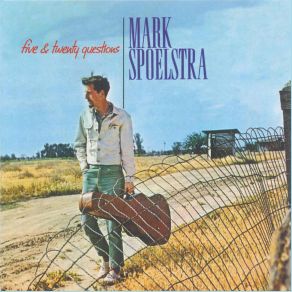Five & Twenty Questions
Download links and information about Five & Twenty Questions by Mark Spoelstra. This album was released in 1965 and it belongs to Blues, Rock, Songwriter/Lyricist, Contemporary Folk genres. It contains 12 tracks with total duration of 47:58 minutes.

|
|
|---|---|
| Artist: | Mark Spoelstra |
| Release date: | 1965 |
| Genre: | Blues, Rock, Songwriter/Lyricist, Contemporary Folk |
| Tracks: | 12 |
| Duration: | 47:58 |
| Buy it NOW at: | |
| Buy on iTunes $9.99 | |
| Buy on Amazon $9.49 | |
Tracks
[Edit]| No. | Title | Length |
|---|---|---|
| 1. | Five and Twenty Questions | 4:50 |
| 2. | On the Road Again | 2:55 |
| 3. | My Love Is Like a Dew Drop | 3:55 |
| 4. | White Winged Dove | 4:05 |
| 5. | Jesse's Jump | 2:06 |
| 6. | Ballad of 12th Ave. | 6:31 |
| 7. | Won't Allow Mankind to Rest | 4:30 |
| 8. | Somebody's Gonna Miss Me | 2:26 |
| 9. | The Leaves | 3:24 |
| 10. | Fife and Drum | 5:21 |
| 11. | Untitled Instrumental | 2:37 |
| 12. | Just a Hand to Hold | 5:18 |
Details
[Edit]Five & Twenty Questions, 24-year-old Mark Spoelstra's third album, marked a creative leap for him. Following his two albums for tiny Folkways Records, Mark Spoelstra Recorded at Club 47 Inc. and Songs of Mark Spoelstra with Twelve-String Guitar (both 1963), it was his first LP to be released by a big independent label, Elektra Records, and it found him making the changeover to original material that had become the dividing line between the older folk singers and the new crop of topical singer/songwriters who were his peers, such as his friend Bob Dylan and his labelmates Phil Ochs and Tom Paxton. The title song, which led off the disc, was in a sense Spoelstra's version of Dylan's "Blowin' in the Wind," a philosophical, questioning song that pointed to the need for social changes. Elsewhere, Spoelstra, who had been raised a Quaker and become a conscientious objector, and who was fulfilling two years of alternative service when he cut this album during a brief vacation, deplored war, notably in "White Winged Dove." In the record's longest song, "Ballad of 12th Avenue," he examined the murderous effects of poverty much as Dylan had in "North Country Blues." But if he had taken up many of the lyrical themes of the topical folk movement, Spoelstra remained a traditionalist when it came to the music, accompanying himself on the 12-string guitar in recognizable strains of folk-blues. Indeed, with three instrumentals mixed in among the songs with lyrics, he seemed less concerned with the message than he was with the music, and his originals tended to sound like traditional tunes. He probably wasn't destined for widespread commercial appeal with such an approach, even before Dylan turned folk into folk-rock later in 1965 and left singers with acoustic guitars in the dust, since his alternative service prevented him from promoting the album. But it represented tremendous growth for him as an artist.